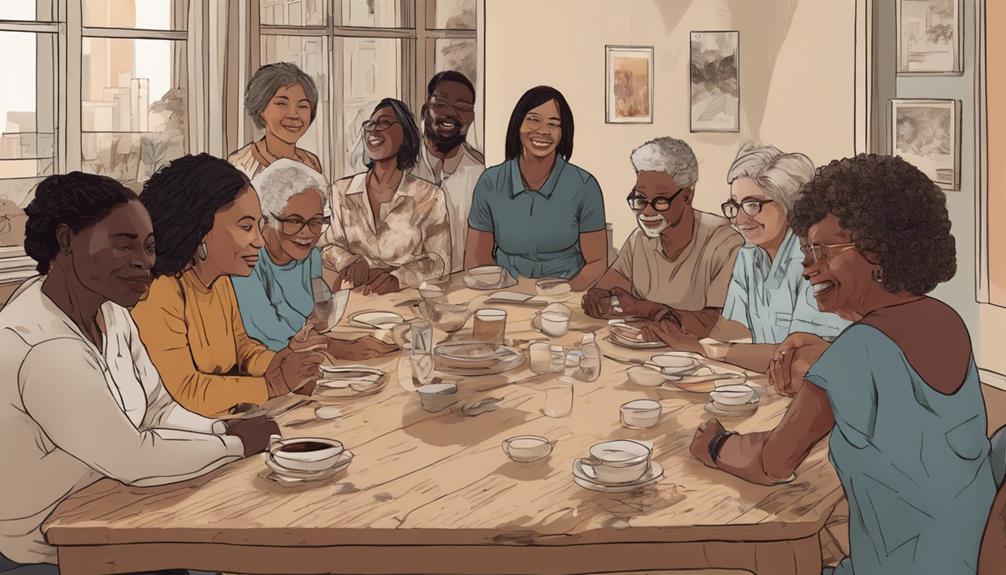Approximately 40-50% of marriages in the United States end in divorce.
Coping with the aftermath of a separation can be incredibly challenging, both emotionally and mentally.
In our guide, we explore practical strategies to navigate this difficult time with resilience and grace.
From understanding the emotional impact to building a support network and fostering personal growth, our guide offers valuable insights and tools to help you navigate the complexities of divorce.
Key Takeaways
- Embrace grieving and seek support for emotional healing.
- Establish clear boundaries and prioritize self-care.
- Seek professional guidance from therapists, lawyers, and financial advisors.
- Build a strong support network for validation, understanding, and resilience.
Understanding the Emotional Impact
As we navigate the challenging terrain of divorce, it's essential to acknowledge the profound emotional impact it has on our well-being. The feelings of sadness, uncertainty, and anxiousness can be overwhelming as we grapple with the emotional distress that accompanies the end of a significant relationship. Coping strategies become vital during this time of conflicting emotions. It's important to recognize that healing is a process that involves allowing ourselves to grieve, seeking support from loved ones or professionals, and focusing on moving forward.
The grieving process after a divorce isn't linear; it involves waves of emotions that may catch us off guard. It's okay to feel a mix of sadness, anger, and confusion. By acknowledging and accepting these feelings, we pave the way for healing. Seeking support from friends, family, or therapists can provide the comfort and guidance needed to navigate this emotional journey. Remember, healing takes time, so be patient with yourself as you gradually move forward towards a brighter future.
Setting Boundaries and Prioritizing Self-Care

Setting boundaries and prioritizing self-care are essential components of navigating the emotional challenges of divorce. Establishing clear boundaries with your ex-spouse can reduce conflict and aid in positively moving forward. Self-care practices such as exercise, meditation, therapy, and spending time with supportive individuals play a pivotal role in reducing stress, anxiety, and depression commonly experienced during a divorce. By setting boundaries, you not only protect your emotional well-being but also foster healthier interactions. Meanwhile, prioritizing self-care is like giving yourself the gift of resilience and strength to face the difficulties ahead. These practices contribute significantly to a smoother transition and adjustment to post-divorce life. Remember, taking care of yourself isn't selfish; it's a necessity for your overall well-being. Below is a table offering some ideas on how to set boundaries and prioritize self-care:
| Setting Boundaries | Self-Care |
|---|---|
| Clearly communicate expectations | Engage in regular exercise |
| Establish personal space and time | Practice mindfulness and meditation |
| Define limits on communication | Seek therapy or counseling |
| Set boundaries on co-parenting | Spend time with supportive friends and family |
Seeking Professional Support and Guidance
Navigating the emotional challenges of divorce often necessitates seeking professional support and guidance tailored to individual needs. When considering seeking professional support during this tumultuous time, it's important to remember that you aren't alone. Here are some key points to consider:
- Therapists and Counselors: These professionals offer emotional support and coping strategies to help you navigate the emotional rollercoaster of divorce.
- Support Groups: Joining a support group can provide a sense of community and understanding as you go through this challenging period.
- Legal Professionals: Divorce attorneys can offer valuable legal advice and representation to guide you through the complexities of divorce proceedings.
- Financial Advisors: Seeking the expertise of financial advisors can assist you in budgeting, asset division, and planning for your financial future post-divorce.
Building a Support Network

Building a strong support network after a divorce is essential for emotional healing and resilience. Friends and family, therapists, support groups, and online communities can all play vital roles in creating this network. These connections provide more than just practical help; they offer validation, understanding, and a sense of belonging during a challenging time.
By surrounding ourselves with supportive relationships, we gain access to valuable advice and different perspectives on coping with divorce. Sharing experiences with others who've walked a similar path can reduce feelings of isolation and offer insights for navigating the divorce process. Each person in our support network contributes to our emotional healing and resilience by providing the comfort and encouragement we need to move forward.
Together, we can find strength in unity and discover new coping strategies that empower us to face the future with courage and hope.
Practical Tools for Healing and Moving Forward
As we focus on practical tools for healing and moving forward, embracing mindfulness techniques like deep breathing and meditation can be instrumental in managing stress and fostering emotional recovery after a divorce.
Engaging in regular physical activity not only releases endorphins but also reduces anxiety, contributing to overall mental well-being.
Journaling about your thoughts and feelings serves as a powerful tool to process emotions, gain clarity, and track your progress in healing.
Seeking therapy or counseling can help you explore your emotions, develop coping strategies, and navigate the challenges of divorce.
Additionally, joining support groups or online forums provides a safe space to connect with others who are going through similar experiences, share advice, and find a sense of community.
Frequently Asked Questions
What Are Some Strategies for Coping With Divorce?
We believe in prioritizing self-care through activities like exercise and meditation. Seeking support from therapists or support groups can provide tailored coping strategies. Setting clear boundaries with your ex-spouse and building a strong support network are crucial.
Who Loses More Financially in a Divorce?
We've learned that, on average, women face a more significant financial impact post-divorce. Their income may drop by 41%, while men's might even rise by 23%. Factors like earning potential and childcare play key roles.
How Do I Avoid Financial Ruins in a Divorce?
We stay mindful of our finances during divorce by prioritizing open communication, seeking expert advice, and documenting everything. Together, we navigate the complexities, explore fair solutions, and safeguard our financial well-being through proactive planning.
Who Is Better off Financially After Divorce?
After divorce, financial outcomes vary. Men often experience a 30% income increase while women face a 20% decrease. Factors like child custody and alimony greatly influence post-divorce finances. Individual circumstances and agreements play crucial roles in financial stability.
How Can I Effectively Support My Children Through Divorce While Coping With My Own Emotions?
Coping with divorce hurt is challenging, but there are ways to effectively support your children. Encourage open communication and validate their feelings. Seek counseling for both you and your children to process emotions. Focus on maintaining stability and routine. Take care of yourself to better care for them.
Conclusion
As we navigate the turbulent waters of divorce, remember: 'After the storm comes the calm.'
By prioritizing self-care, seeking support, and allowing ourselves to grieve, we can heal and move forward with strength and resilience.
Let's lean on our support network, embrace the journey of personal growth, and remember that brighter days are ahead.
Together, we can weather this storm and emerge stronger on the other side. Stay strong, dear ones.










